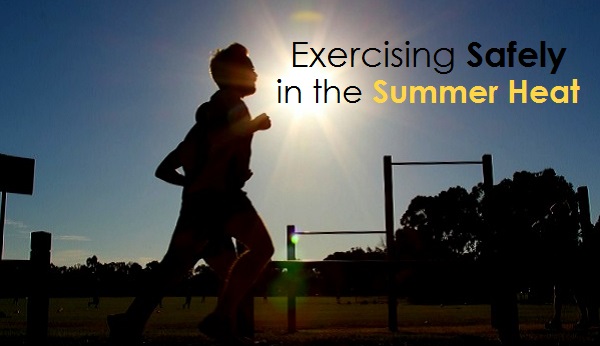Exercising Safely in the Summer Heat
Cary, NC — It’s summer time, and that means there will be plenty of opportunities to enjoy the sun and outdoors. However, with summer comes increased temperatures, increased humidity and extra precautions to take if you are playing a sport or exercising outside.
Heat Related Illnesses
Heat Cramps – Heat cramps are intense muscle spasms that usually occur in the calves, hands, feet or other major muscles groups being exercised. Muscles are going to feel firm or hard, and they can occur without a dramatic increase in body temperature.
Heat Exhaustion – Heat exhaustion occurs after a rise in body temperature causing your body to overheat. Exercising in increased heat, and high humidity can be the cause of heat exhaustion. Initial symptoms may be heavy sweating and a rapid pulse. Other symptoms include:
- Nausea
- Fatigue
- Headache
- Excessive thirst
- Weakness
- Dizziness
- Cold Clammy Skin
Heat Stroke – Heat stroke is the most serious and life threatening form of heat related illnesses. Heat stroke usually occurs when your body temperature rises to 104 degrees Fahrenheit or above. Symptoms include:
- Nausea and vomiting
- Headache or Dizziness
- Fatigue
- Dry Skin
- Rapid Pulse
- Decreased Sweating
- Confusion or Loss of Consciousness
- Shortness of Breath
It’s important to remember if you are experiencing symptoms of heat exhaustion or heat stroke you should seek medical assistance immediately.
Safe Ways to Exercise in the Heat
Being able to enjoy the outdoors is one of the best parts of summer, so you don’t need to stop training outside when summer rolls around. Here are 10 tips to remember while exercising outdoors in the summer.
- Stay hydrated – Replace fluids and electrolytes that you are losing through sweat
- Don’t exercise during peak heat and humidity – Try training during the early morning or evenings
- Dress appropriately – Wear clothes that are breathable and will help keep you cool
- Check the weather forecast for temperature, humidity, air pollution and other factors that may impact your training session
- Don’t forget about sunscreen – Protecting your skin is important and recent studies show that wearing sunscreen does not negatively impact your body’s ability to dissipate heat.
- Talk to your medical professional about the prescription drugs you may be taking – Certain drugs can play a role in how your body will react to exercising in hot temperatures
- Train with a partner – This way, help won’t be far away in case you start to experience symptoms of heat related illness
- Pay attention to your heart rate
- Use shade to your advantage – Train in an area that provides shade and relief from the hot summer sun
- Listen to your body and pay attention to signs of heat related illness
Stay Safe, Exercise Smart
Exercise is a great way to stay fit and improve your physical and mental health. Don’t let the summer heat stop you from maintaining a regular fitness routine. Just make sure to take the necessary precautions, and stay alert for warning signs of heat related illness. When in doubt, seek professional advice in developing an appropriate exercise plan.
About the Author
Dr. Kevin Prue PT, DPT, CSCS is a graduate of Duke University’s Doctor of Physical Therapy Program. He is the president and director of Prue Physical Therapy & Sports Performance located in Cary. He specializes in sports and orthopedic physical therapy, sports performance training and injury prevention for youth and recreational athletes.
Connect with Dr. Prue on Facebook or Twitter, email him directly at kevin.prue@pruept.com or visit www.pruept.com for more information.
———————————————————————————————————————————
Story contributed by Dr. Prue of Prue Physical Therapy & Sports Performance. Photo by will ockenden.



